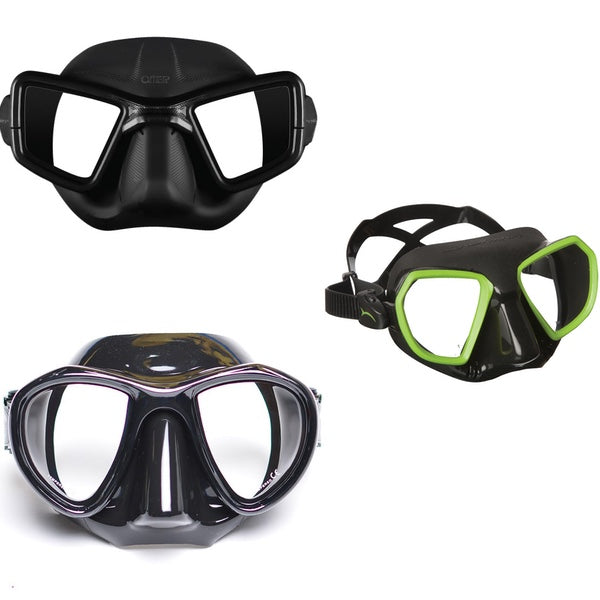
Picking The Right Mask For Freediving
Comfort
The most important aspect of picking the right mask is how comfortable it feels on your face. Everyone is different, so it makes sense that not every mask works for every diver. Modern dive masks have the benefit of being made with high grade silicone skirts. These quality skirts help provide a great seal on the face of almost every diver. The mask's frame is what can make it uncomfortable for a diver. Masks can however fit differently on different faces. That means that the best way to find out if a mask works for you is to try it on.
Testing For The Right Mask
To try on a mask pull the mask strap in front of the mask so just the skirt and the suction on your face holds the mask in place. Push the mask into your face to see where the mask frame may come into contact with your face as the air in your mask loses volume and presses into your face during a dive. If the frame pushes into your forehead or the bridge of your nose in an uncomfortable way you should consider a different mask.
Mask Volume
Mask volume has a lot to do with picking the right mask for you. Generally, a low volume mask is the best option for most diving. They have several benefits for divers. The biggest benefit of a low volume mask is that we can use less air to equalize it. If you do not equalize your mask as you dive deeper, you will experience mask squeeze. Mask squeeze is when the reduced airspace in your mask sucks on your face. Mild cases just result in temporary discomfort, but in extreme cases you can have a very tight pain and the mask can burst blood vessels in your eyes which will terrify your friends and family. Low volume masks reduce the amount of air you need to supply to your mask to prevent this issue form occurring, which helps with your breath hold.
Another benefit to low volume masks is greater peripheral vision. The further away the lenses of your mask, the more of a tunnel effect you have from your point of view. Low volume masks bring the lenses closer to your eyes to reduce volume, which provides a greater peripheral vision compared to larger volume masks.
Types of Lenses
Masks can be made out of several different material that can influence what is the right mask for you. Lens material is a big factor in picking the right mask. There has also been an increased popularity in reflective lenses compared to non-reflective lenses over the past several year.
Lens Material
One of the biggest factors in mask selection is the lens material. Most mask lenses are made with tempered glass. The tempered glass is less likely to scratch and is generally very durable. Tempered glass is also easier to defog and break in compared to other lenses on some masks. Some masks use plastic lenses to help reduce their volume. This is accomplished by having a curved lens rather than a flat face. The curved lenses distort a divers vision. The challenge with plastic lenses is that they are harder to defog and are easily scratched up. The biggest benefit to a mask with a plastic lens is they tend to cost much less than masks with tempered glass lenses. A tempered glass lens should be a big consideration for the right mask.
Reflective and Non-Reflective Masks
Many masks have become available with reflective lenses. There are several reasons these masks have become popular over the past several years. Many divers believe this helps when hunting reef species that are wary of diver. The reflective lenses theoretically prevent those fish from see a divers eyes, which spook the fish. There is something to be said about eye movement spooking wary fish species for sure, but some other divers prefer non-reflective lenses. In dirty water there is something to be said about wanting as much light to get to your eyes as possible. Every diver has their preferences in this regard.
